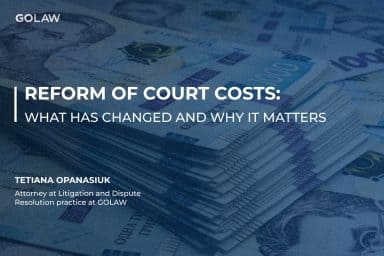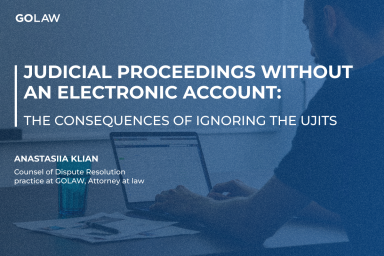Protecting Banks from Unfair Debtors: Conclusions of the Joint Event by GOLAW and the European Business Association
Tags
The special aspects of how banks deal with the bad debt was the main topic of the expert discussion “Protecting Banks from Unfair Debtors” held in Kyiv on 24 October. The speakers of the event were: Pavlo Polyarush, the Head of Problem Assets Management Division at National Bank of Ukraine, Artur Zahorodnykov, the Deputy Chairman of the Board of the PUMB, Andrii Stetsevych, the Deputy Chairman of OSCHADBANK, Vasyl Furman, a member of the Board of the National Bank of Ukraine, Galina Kočendova, the Deputy Director at Claims Settlement and Debt Recovery Department at Export Guarantee and Insurance Corporation (EGAP), Iryna Kalnytska, GOLAW Partner, Head of Restructuring, Claims and Recoveries practice.
The special aspects of how banks deal with the bad debt was the main topic of the expert discussion “Protecting Banks from Unfair Debtors” held in Kyiv on 24 October. The speakers of the event were: Pavlo Polyarush, the Head of Problem Assets Management Division at National Bank of Ukraine, Artur Zahorodnykov, the Deputy Chairman of the Board of the PUMB, Andrii Stetsevych, the Deputy Chairman of OSCHADBANK, Vasyl Furman, a member of the Board of the National Bank of Ukraine, Galina Kočendova, the Deputy Director at Claims Settlement and Debt Recovery Department at Export Guarantee and Insurance Corporation (EGAP), Iryna Kalnytska, GOLAW Partner, Head of Restructuring, Claims and Recoveries practice.
The moderator of the event was Svitlana Mykhailovska, the Deputy Director for Representing the Corporate Members of the European Business Association (EBA).
According to Pavlo Polyarush, the Head of Problem Assets Management Division at National Bank of Ukraine, NPL (editor’s note: non-performing loans) were around 50 % of Ukraine’s bank portfolio, and most of these loans were concentrated in the state-owned banks. “The principal task of the National Bank is to process and find the ways to resolve the banks’ issues with the non-performing loans in order to encourage all the Ukrainian banks to grow, engage investors and develop corporate lending,” the speaker noted. Pavlo also noted that the overall situation in the banking sector is much better than it used to be several years ago since more and more banks are getting sufficiently capitalised, sustainable and profitable.
Artur Zahorodnykov, the Deputy Chairman of the Board of the PUMB, gave an overview of the banking market and emphasised the positive tendency of reduction of the share of the non-performing portfolio against the total volume of the loans, “In 2017 and 2018, the total non-performing portfolio against all the loans was 54 % while the total volume as of 1 September 2019 is 49 %. In other words, there is a positive tendency to be maintained.” The speaker also noted that the non-performing portfolio of the state-owned banks was 72 % of the total NPL portfolio of the banking sectors. “I see two ways to resolve the issue: to accelerate the reforms and to resume practical resolution of the issues related to privatisation of the state-owned banks. The market has positive examples of how to deal with the bad debt efficiently. For instance, the NPL in the FUIB is a bit more than 10 %, with the positive decrease tendency, while the volume of repayment of the bad debt for the last three years has been more than five billion hryvnias,” the speaker stated.
According to Andrii Stetsevych, the Deputy Chairman of OSCHADBANK, elimination of related persons from the loan portfolios must be one of the priorities of the National Bank and the Ministry of Economy, namely, “All over the world, the loan portfolio of the small and medium-sized business is 50 to 60 % while it is 23 % in Ukraine. In other words, the economic situation is totally distorted, which demonstrates the low level of small and medium-sized business development level in the country. Of course, corporate lending must be developed given the stated numbers; otherwise, we will get an inverse pyramid.” Andrii also noted that the main cause of bad debts in the financial institutions was the internal fraud and non-compliance with their by-laws as well as risk transactions related to overly-optimistic forecasts of the situation.
According to Iryna Kalnytska, GOLAW Partner, Head of the Restructuring, Claims and Recoveries ppractice, the main cause of the issues faced by the financial institutions in foreclosure on the pledged property was insufficient legal and technical audit at the stage of concluding of the pledge and mortgage agreements, “We have worked with the agreement where the chief installation work and commissioning works were documented as pledge. Of course, the bank is physically unable to foreclose on such ‘property’.” Iryna also noted that the amendments to the law on protecting the lenders’ rights, which had entered into force in 2019, gave the lenders more efficient tools to foreclose on the pledged property and simplified the procedure itself considerably.
Vasyl Furman, a member of the Board of the National Bank of Ukraine, noted that the “slow structural reforms for 28 years of the independence” decelerated development of the country, so the high-quality changes at the legislative level and development of the powerful government institutions based on the European standards were the only way to ensure prompt positive shifts. “There is a proportional relation today: activation of lending in the country directly depends on how quickly the issue of bad debts will be resolved, and whether the supremacy of law will dominate in all the areas of life of the Ukrainians. There is an equivalent relation in the economic reforms: the faster the reforms are, the faster the GDP will grow,the better the financial depth of the economy will be, and the faster the public welfare will improve.” Vasyl also emphasised how important it was to complete the judicial reform as the very important aspect in resolution of disputes on repayment of debts or bankruptcy is impartiality of the judges hearing the cases.
As Ihor Vinnytskyi, GOLAW Counsel, Head of the Business Defence practice, noted, the business protection issue had to be one of the “constituent elements of business management”. According to the speaker, in order to mitigate the risks the banks might face in dealing with unfair debtors, it was necessary to adhere to four basic rules: analysis of potential threats related to lending; management of risks that may appear in the future; control over operations of the company requesting the loan; and analysis of the outcomes and mistakes. “You must be well aware of the difference between risks and threats: a risk is subjective results of a certain action at the certain level of hazard while a threat is an objective thing that already exists. When threats are assessed, it is necessary to analyse the debtor’s business reputation, to study the business area and the company’s history,” Ihor noted.
The importance of the bank’s control over the debtor’s activity was also emphasised by Galina Kočendova, the Deputy Director of the Department for Collecting Bad Debts at EGAP (Czech Export Guarantee and Insurance Corporation). “The banks we insure must carry out control in accordance with the insurance policy. They hire a contractor that performs such audit, but it is done at the minimum, low-quality level. A debtor is always more crafty, so the bank understands that everything is bad when the rights to the pledged property are very difficult to return,” the speaker noted.
Galina also stated that foreign investment into Ukraine would grow only in case the investors saw that the country had been sustainable for a long time.
The event was organised by the European Business Association in Ukraine and GOLAW Law Firm.
Thanks to all the participants!
Sign up to be aware
New achievements are inspired by information. GO further, don’t miss out GOLAW news and legal alerts
Our expertise
-
- Antitrust and Competition
- Banking and Finance
- Compliance, Corporate Governance and Risk Management
- Corporate and M&A
- Criminal and White Collar Defence
- Defense in Anti-corruption procedures and regulations
- Labor and Employment
- Natural Resources and Environment
- Government Relations (GR)
- Insolvency and Corporate Recovery
- Intellectual property
- International trade
- Legal support of business and private Сlients in Germany
- Litigation and dispute resolution
- Private clients
- Real Estate and Construction
- Energy and Natural Resources
- Restructuring, Claims and Recoveries
- Martial Law
- Tax and Customs
-
- Agribusiness
- Aviation
- Chemical industry
- Engineering, Construction and Building Materials
- Natural Resources and Environment
- Financial institutions
- IT and AI
- Industry and manufacturing
- Healthcare industries, Life sciences and Pharmaceuticals
- Media, Entertainment, Sports and Gambling
- Retail, FMCG and E-Commerce
- Transport and Logistics
We use cookies to improve performance of our website and your user experience.
Cookies policy
Cookies settings







